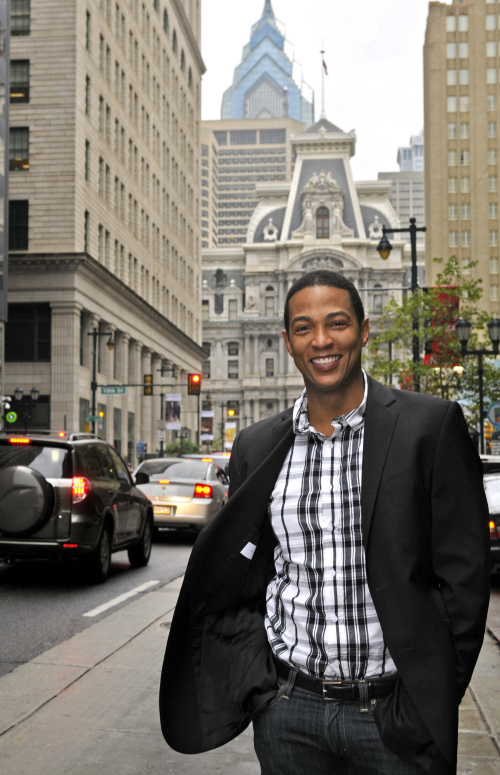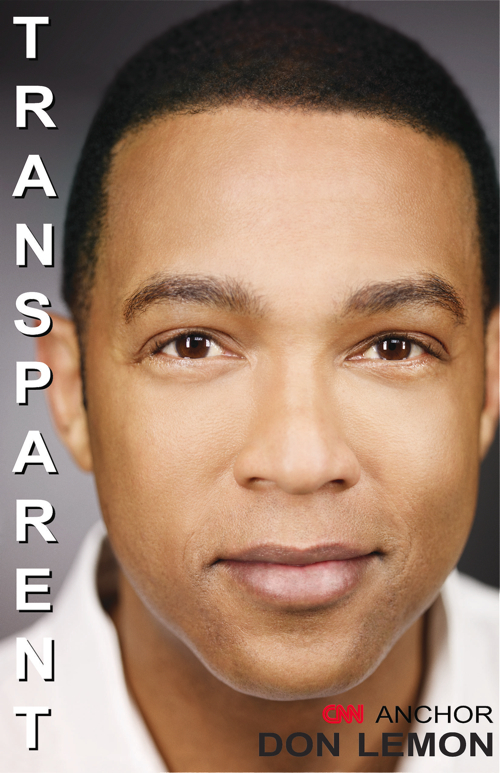Want a yardstick for how far into the post-ironic era we have drifted?
This summer, TV newsman Don Lemon published a memoir, “Transparent,” in which he came out as gay and talked about being sexually abused as a boy.
Yet he got far more attention for a snarky three-minute segment that Jon Stewart devoted to him last month on “The Daily Show,” titled, “CNN Anchor Don Lemon appears not to care for CNN.” The bit consisted of a series of clips in which Lemon again and again curtly refused to engage in the usual happy-talk banter with the rest of the on-air talent. Lemon’s disdain for clowning had Stewart giggling uncontrollably.
This summer, TV newsman Don Lemon published a memoir, “Transparent,” in which he came out as gay and talked about being sexually abused as a boy.
Yet he got far more attention for a snarky three-minute segment that Jon Stewart devoted to him last month on “The Daily Show,” titled, “CNN Anchor Don Lemon appears not to care for CNN.” The bit consisted of a series of clips in which Lemon again and again curtly refused to engage in the usual happy-talk banter with the rest of the on-air talent. Lemon’s disdain for clowning had Stewart giggling uncontrollably.


Lemon was watching the show at home in Atlanta with a friend when he suddenly found himself being the story instead of reporting it.
“I was having fun, laughing and tweeting,” he says. “I tweeted, ‘Jon Stewart is going in on the President,’ ‘Now he’s giving it to Boehner and Congress.’
“Then it came back from commercial, and my name and face came up. I tweeted, ‘Oh my gosh!’ My friend and I looked at each other and said, ‘Uh-oh.’ He turned up the volume, and I walked out of the room. I said, ‘I can’t watch it.’”
Sitting in a restaurant in a Philadelphia hotel before discussing his book at the recent National Association of Black Journalists convention, Lemon offers a curious explanation for the stern on-air manner captured by “The Daily Show.”
“That’s just my sense of humor,” he says. “Some people have a very dry wit. I don’t want to be too goofy or too cutesy on television.”
His strictly business attitude helps explain his meteoric rise as a newsman, starting with stints as a reporter at local stations in Birmingham, Ala.; St. Louis; and Philadelphia.
He then hopscotched to weekend correspondent for NBC’s “Today” show, to evening news anchor in Chicago, and finally, in 2006, to CNN, where he has risen to prime-time weekend anchor.
Along the way, he gained a reputation as a talented, if often imperious, journalist.
You get a taste of that in the book, when he describes bridling at one of his first assignments in Chicago:
“Sending me, with all I had learned from my experiences with NBC News, out to cover a shooting was like sending a tank to break up a fight between kindergartners. It was truly a waste of my talent and experience.”
In “Transparent,” Lemon chronicles growing up in Louisiana with a single ambition: to become a TV newsman.
His earliest role models, he says, were “Peter Jennings and Max Robinson. And later Bryant Gumbel. I loved Peter Jennings. He was so smooth and natural.”
At 5, he was sexually molested by a neighborhood teen, abuse that went on for years.
Sitting in the restaurant, he explains that the experience caused him to split off from himself.
“When I was a kid, I just pushed it down,” he says. “You don’t want to think about it. You live during the times your abuser’s not there. Then, when they’re there, you shut yourself down and say, ‘This will be over with soon.’”
By the time he became an adult, Lemon was severely repressed.
“I went to LSU,” he says. “I did crazy things. I drank a lot and didn’t study. I wasn’t a bad kid, but I had issues, including the fact that I was gay and didn’t tell people.”
His face still remarkably boyish-looking at 45, Lemon maintains that he found himself when he dropped out and moved to New York City, where he worked as a support staffer at the local Fox affiliate.
“For the first time, I was free to be who I was,” he says. “I was in an environment with all kinds of people, not just ethnicity, but gay people, straight people, bisexual people. There were even transgender people I worked with in the newsroom. I was like, ‘Wow, this is different.’”
Even after years of therapy, he still carries scars from the sexual abuse he suffered as a child.
In the book he writes:
“Like many survivors of childhood molestation, I find it hard to become close to people. I find it hard to trust. I feel myself to be ‘different’ in ways that aren’t always good. Though I’ve done my best to erase the shame by talking about it, and by trying to understand what happened and why, and even to find some measure of forgiveness for the boys who perpetrated it, I know the experience has had negative ramifications for me, especially in terms of relationships.”
He has long been extremely comfortable with his sexual identity, however. In fact, during his time in Philadelphia, he was a presenter at what was then called the Philadelphia International Gay and Lesbian Film Festival.
“Among my friends and coworkers that I had a relationship with, I was out, but I never said the words publicly,” he states. “It wasn’t a big coming-out” in the book.
He will be back in Philadelphia as the keynote speaker Aug. 27 at the National Lesbians and Gay Journalists Association convention.
Lemon loves the City of Brotherly Love.
“I bought my first house in Philadelphia,” he says. “I met the best friends of my life in Philadelphia. I grew up as a journalist in Philadelphia.
“People don’t realize how great it is. I think it’s a well-kept secret.”
Not anymore. Don Lemon no longer believes in secrets.
By David Hiltbrand, The Philadelphia Inquirer
(McClatchy-Tribune Information Services)






![[From the Scene] Monks, Buddhists hail return of remains of Buddhas](http://res.heraldm.com/phpwas/restmb_idxmake.php?idx=644&simg=/content/image/2024/04/19/20240419050617_0.jpg&u=20240419175937)







![[From the Scene] Monks, Buddhists hail return of remains of Buddhas](http://res.heraldm.com/phpwas/restmb_idxmake.php?idx=652&simg=/content/image/2024/04/19/20240419050617_0.jpg&u=20240419175937)

![[KH Explains] Hyundai's full hybrid edge to pay off amid slow transition to pure EVs](http://res.heraldm.com/phpwas/restmb_idxmake.php?idx=652&simg=/content/image/2024/04/18/20240418050645_0.jpg&u=20240419100350)

![[Today’s K-pop] Illit drops debut single remix](http://res.heraldm.com/phpwas/restmb_idxmake.php?idx=642&simg=/content/image/2024/04/19/20240419050612_0.jpg&u=)